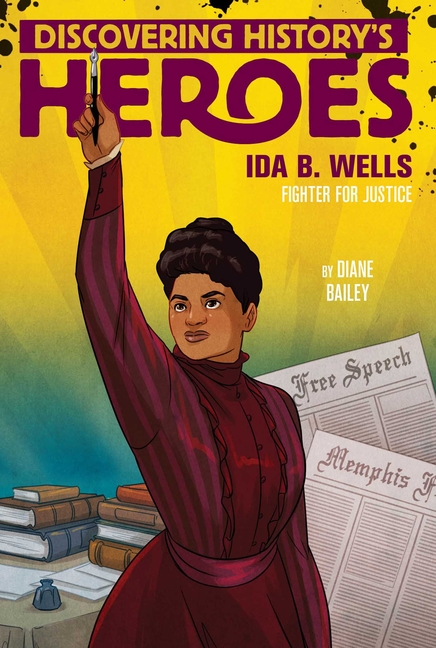Ida B. Wells: Fighter for Justice (Discovering History's Heroes #1)
by Diane Bailey (Author)

Jeter Publishing presents a brand-new series that celebrates men and women who altered the course of history but may not be as well-known as their counterparts.
Ida B. Wells was an African-American journalist and activist who led an anti-lynching crusade in the United States in the 1890s.
On one fateful train ride from Memphis to Nashville, in May 1884, Wells reached a personal turning point. Having bought a first-class train ticket, she was outraged when the train crew ordered her to move to the car for African Americans. She refused and was forcibly removed from the train--but not before she bit one of the men on the hand. Wells sued the railroad, winning a $500 settlement. However, the decision was later overturned by the Tennessee Supreme Court.
This injustice led Ida B. Wells to pick up a pen to write about issues of race and politics in the South. Using the moniker "Iola," a number of her articles were published in black newspapers and periodicals. Wells eventually became an owner of the Memphis Free Speech and Headlight, and, later, of the Free Speech.
She even took on the subject of lynching, and in 1898, Wells brought her anti-lynching campaign to the White House, leading a protest in Washington, DC, and calling for President William McKinley to make reforms.
Ida B. Wells never backed down in the fight for justice.
 Locate at a Library Near You
Locate at a Library Near You WorldCat is the world's largest library catalog, helping you find library materials online.
Find books about:
School Library Journal
Gr 4-6--Bailey explores Wells's journey to becoming a prominent part of the fight for African American equality in the United States. Readers learn about Wells from her time as a young teen to her death. She is an often overlooked part of the history of civil rights, but Bailey does a superb job of maintaining readers' interest through a chronological account of Wells's journey. The author highlights particularly tense moments when Wells's work became dangerous, such as being a vocal crusader against lynching. As a young teen, Wells made the decision to care for her siblings after her parents' death. She faced considerable challenges, as supporting a large family with a meager education at the turn of the century was difficult. Additionally, many people thought the odds were against Wells due to her race and gender. She proved her naysayers wrong and used her skills, grit, and determination to become an undeniable force in journalism. Each chapter has bolded words that are clearly explained in context, and a glossary is provided at the end of the book. This vocabulary addition is helpful with terms that require some content knowledge for full understanding. VERDICT Readers who appreciate nonfiction and biographies will enjoy the quick pace and suspenseful moments detailed in this look at the life of Ida B. Wells. Bailey's writing is clear and accessible to young readers who will understand the perilous risks Wells took as she fought against racism.--April Sanders, Spring Hill College, Mobile, AL
Copyright 2019 School Library Journal, LLC Used with permission.Review quotes
Subject consultant Priti Mishra is a historian at the University of Southampton, where she teaches a module called Gandhi and Gandhism.
Literacy consultant Stephanie Laird is an instructional coach at Mitchellville Elementary in Mitchellville, Iowa, and is currently serving on the International Literacy Association's (ILA) Board of Directors through 2019. She was the 2014 recipient of the ILA Technology and Literacy Award. Stephanie is the President-Elect of the Iowa Reading Association and was the 2017 Conference Chair of the Iowa Reading Association's annual conference. Along with being an ambassador and advocate for education, literacy, and teacher leadership across her state, Stephanie was a member of ILA's Literacy, eLearning, Communication, and Culture Committee and has contributed to the International Literacy Day Activity Kit, Literacy Daily, and ReadWriteThink.
JNF018010 - Juvenile Nonfiction | People & Places | United States - African-American
JNF053140 - Juvenile Nonfiction | Social Topics | Prejudice & Racism
JNF007110 - Juvenile Nonfiction | Biography & Autobiography | Social Activists
JNF060000 - Juvenile Nonfiction | Media Studies
African Americans
African American women civil rights workers
Civil rights workers
United States
Civil rights
Social conditions
Race relations
Lynching
Wells-Barnett, Ida B.
African American women journalists
To 1964
African American women educators




